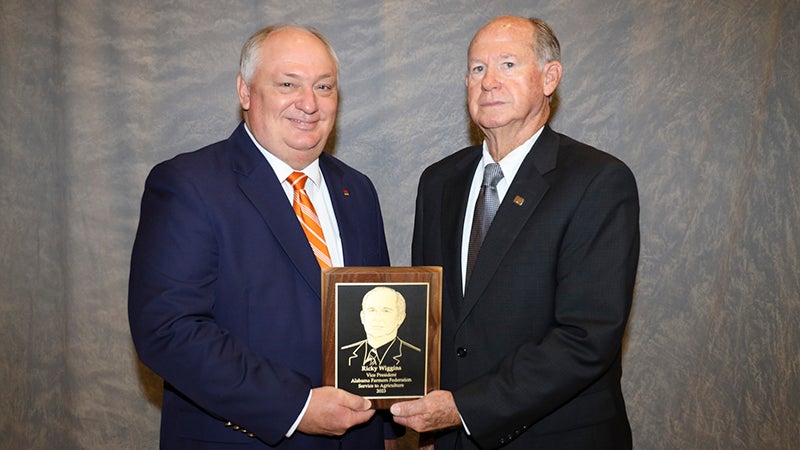Wiggins receives Service to Agriculture award from Alabama Farmers Federation
Published 10:11 am Monday, December 4, 2023

- Covington County farmer Ricky Wiggins, right, received the Service to Agriculture Award Dec. 4. The award is the Alabama Farmers Federation’s highest honor and was presented during the organization’s 102nd annual meeting in Montgomery. Wiggins is a row crop and cattle farmer in the Carolina community. He is pictured with Federation President Jimmy Parnell. (PHOTO PROVIDED)
|
Getting your Trinity Audio player ready...
|
Written by Marlee Jackson
Faith. Family. Farming.
Those ideals have influenced Ricky Wiggins for seven decades.
It’s fitting the humble, hard-working farmer received the Alabama Farmers Federation’s highest honor during an annual meeting bearing that same theme, said Federation President Jimmy Parnell.
“Ricky is one of those men you can sit with and just talk about farming and life,” Parnell said. “He’s a deep thinker and a man of even deeper faith. That shows. Ricky has a desire to do what’s right, whether on his farm in Covington County or in the nation’s capital fighting for farm policy reform. I’m pleased to present Ricky this Service to Agriculture Award.”
Since 1965, the Service to Agriculture Award has honored Federation leaders, politicians, agricultural icons and innovative researchers for work impacting farmers and rural Alabama. Wiggins was presented the award during General Session II Dec. 4 in Montgomery.
A former Federation Southeast Area vice president, Wiggins has a strong moral compass and sharp business sense honed through success and struggles on his family farm outside Andalusia.
Wiggins partnered with his father, Gene, on the diversified family farm in the Carolina community shortly after marrying wife Sharon in 1971. Within a decade, the farm included peanuts, soybeans, corn, custom harvesting and hogs, plus children Heather, Russell, Shonna and Kristen.
The early ‘80s brought devastating local drought, debilitating interest rates and declining commodity prices. Farms across the U.S. were in foreclosure, including Wiggins’.
“I was sitting in my office one night, and it was fixing to happen,” said Wiggins, now 73. “I was crying and praying and figuring. I finally said, ‘Lord. Thank you. I don’t know where I’ll be down the road, but wherever I am, I will be a better man, a better husband, a better father, a better Christian, and I will definitely be a better businessman, whether on this farm or wherever I am.’”
The next day, a good Samaritan offered to help save the farm. It was a gracious gift from God, Wiggins said.
“We still have struggles, and we have trying times, but the Lord has been good to us,” he said.
Following the crisis, Wiggins streamlined the farm to its current rotation of cotton and peanuts, plus stocker cattle. He also partnered with Russell once the younger Wiggins earned a degree from Auburn University (all three sisters studied at the land-grant school, too).
The Wigginses firmly believe in conservation tillage, first implemented on their farm in 1993 via cover crops and strip tillage.
“The main reason at the time was erosion control,” Wiggins said. “Everyone was saying, ‘No till, no yield.’ Nobody believed in it around here back then.”
After a few years, it was clear: Their soil wasn’t washing away.
A subsequent move to high-residue cover crops made field work more difficult but built soil quality and improved organic matter. Yields increased, too.
“We are proponents, even advocates, of conservation tillage,” Wiggins said. “I think it’s one of the best things we’ve ever done.”
In addition to on-farm improvements, Russell’s return allowed Wiggins to grow involvement in the Federation, where he’d previously served on the State Young Farmers Committee. He joined the Covington County Farmers Federation board, served as District 10 director and assumed leadership roles through commodity organizations. Wiggins was elected Southeast Area vice president in 1998.
Wiggins simultaneously cultivated a passion for farm policy. Sharing his ideas built from personal experiences spanned testifying on Capitol Hill as well as farm bill discussions with decision-makers knee-high in Covington County cotton.
Wiggins was a key player, too, as the Federation rejoined the American Farm Bureau Federation in 2004, citing Alabama farmers’ need for a national voice.
Today, Wiggins intentionally invests in the interwoven tenets of faith, family and farming. A small grin breaks across his face when mentioning his and Sharon’s “fiercely independent” children and 13 grandchildren, a close-knit crew that prioritizes dinners, vacations and worship at Carolina Baptist Church.
That’s in addition to farm work and agricultural community involvement. Wiggins chairs the Alabama Boll Weevil Eradication Foundation, though he’s stepping back from other roles to encourage younger generations to serve.
A man of few words, Wiggins is quick to praise his peers.
“There’s a world of people who are really great leaders that I’ve had an opportunity to be associated with over the last 50 years,” he said. “Anyone you talk to or visit, you can learn from.”





